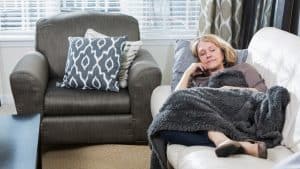
Some of my friends refuse taking a midday nap, even though they feel chronically tired. They worry it will ruin their nighttime sleep. They tell me that if they take a daytime nap, they either lay awake at night wishing they could drop off to sleep, or they wake up at some terrible hour because they don’t need the sleep.
I’m as surprised as you are that research has a lot to say about napping dos and don’ts and the good or bad that can come from a midday nap.
Was I Being Lazy?
After I left my corporate job, I took as nap every single day for a month. Nothing felt better than having the time to curl up in my comfortable home, refresh my body, and nap. My mind and body had had enough of wake-up alarms at 5:30 a.m., consistent mental stress on the job, and feeling worn down as I drove away from work (yet never leaving work at the office).
I gave myself a month’s worth of midday naps as a gift to me. After that month, my internal voice kept telling me I was lazy. I know now that wasn’t true. I was still sorting out and eliminating the familiar old voice that told me to push to produce more, accomplish more, and work nonstop as I had done for so many years.
Now that I’ve left that job behind for a full year, I listen to my body. If I feel achy or sleepy, I grab the softest blanket I have and curl up on my sofa with my cat for a heavenly nap.
Age Affects Sleep
Researchers are finding in studies that naps are beneficial. Have you noticed that with each passing year it’s more difficult to get a good solid night’s sleep? That’s right, age affects sleep, and not in a good way. Naps help you balance the amount of sleep you need as well as help with creative problem solving and cognitive thinking.
What’s More…
Getting enough sleep improves memory, energy and your mood. A nap of 30 minutes can reduce fatigue, irritability, low motivation and improve your memory! No wonder these benefits are now being recognized by some of those in the corporate workplace.Progressive companies like Google encourage midday napping by providing employees with sleep pods or nap rooms!
How to Take a Quick Nap
Healthy napping midday comes with some simple but really important dos and don’ts.
#1: Find a comfy place that’s both cool and dark. Pull the shades or try a sleep mask for fun.
#2: Clear your mind of stuff. This takes practice but allowing your brain to rest is worth it. What works for me is to imagine that my brain is a muscle I’m releasing and relaxing tension from as I feel my head sink into the pillow.
#3: Time your naps. This is IMPORTANT! Mayo Clinic research says that napping at the wrong time of day or for too long can backfire.
Napping tips
- Nap before 3 p.m. if possible. Later than that could affect your ability to sleep at night.
- Block out light. Sleep masks work great for this.
- Time your naps to be 20 to 30 minutes. Set a timer so you don’t sleep longer! These short naps are referred to as power naps. When sleeping longer than the 20-30 minutes you could enter into a deeper sleep, and when you wake up it’s harder to feel alert and ready to go. Short naps (according to Mayo Clinic Research) generally don’t affect nighttime sleep for most people.
- Health benefits of naps DECLINE if you allow naps to be longer than 60 minutes. Lengthy day time napping can be linked to (does NOT cause) serious health conditions (diabetes, metabolic syndrome, cardiovascular disease, and Type 2 diabetes).
When NOT to Take a 20-Minute Nap
- If you are experiencing jet lag or have worked the night shift, you may need a longer nap time in your schedule to catch up.
- If you know you will be sleep-deprived in the near future, you can try to bank up some sleep time.
- When recovering from an illness, nap longer and more frequently until you feel better.
- Babies and young children need longer naps than 20 minutes.
It surprises me that long daytime naps can be linked to serious health conditions. Yet a short daytime nap has great health benefits! I find this to be important yet widely unknown information.
Coffee and a 20-Minute Nap
Dr. Sara C Mednick, PhD, on staff at Harvard, wrote a book, Take a Nap, Change Your Life, The Scientific Plan to Make You Smarter, Healthier, More Productive. She coined the phrase, Nap a Latte. She suggests drinking a cup of coffee, then laying down for a quick 20-minute nap.
By the time the caffeine begins to kick in, your nap is over, and you’ll wake up refreshed. Here’s an excerpt from her book:
“During the nap, your body will reduce adenosine, that substance that builds throughout the day and makes you sleepy. (Remember, caffeine fits perfectly into that receptor in the brain.) So, you wake up just as the stimulating effects are kicking in.”
This piques my curiosity. I’m going to try it.
Green Light to Naps
Now I have a green light to go ahead and take a nap without guilt or feeling lazy. You have the green light too. How nice to have something so wonderful bring out our best!
What about you? Are you a nap taker? Have you tried the 20-minute power nap? What helps you feel more alert in midday? What do you think about “Nap a Latte”? Let us know your thoughts on midday napping.





